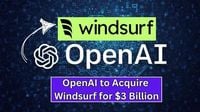In a landmark move that’s already sending waves through the tech world, OpenAI is acquiring Windsurf for a staggering $3 billion. This deal, confirmed in early May 2025, marks the largest acquisition in OpenAI’s history and one of the most pivotal mergers in the field of artificial intelligence to date. Whether you’re a developer, a tech leader, or someone simply curious about AI’s rapid evolution, this news matters—big time.
But what does this acquisition really mean for the future of AI, especially in the world of AI coding assistants? How does this reshape the competitive landscape? And most importantly, what should developers and businesses expect moving forward? Let’s dive into the full story with context, data, expert insights, and actionable takeaways.
OpenAI’s acquisition of Windsurf is a game-changer for AI-assisted coding. It accelerates OpenAI’s ambitions to own the developer experience, not just the model behind it. Developers can expect smarter, faster, and more integrated coding workflows, while businesses gain tools that offer performance without compromising privacy or control. This move also signals a new chapter in AI—one where the battle isn’t just about models, but about who owns the tools we use every day.
Windsurf, previously known as Codeium, is not just another code autocompletion tool. It’s a sophisticated AI-native coding assistant used by software developers, product engineers, and enterprise teams to accelerate development workflows. What makes Windsurf stand out? It offers inference-time context compression, allowing it to remember just the right amount of your codebase to give relevant suggestions without lag. Designed for speed, it ensures that AI doesn’t slow you down, and it features enterprise-grade deployment with privacy-first models and fine-tuning capabilities.
With OpenAI acquiring Windsurf, it gains a direct pipeline into the IDEs of millions of developers. Rather than only offering code support via ChatGPT, OpenAI now has a platform that’s built for developers from the ground up. This isn’t just a big-money tech merger—it’s a strategic shift. Previously, OpenAI focused on building large foundational models like GPT-4 and GPT-5. But this move shows they’re going further: owning the applications developers actually use daily.
“It’s not just about having the best model. It’s about being where the developer lives,” said Alex Atallah, co-founder of OpenSea. By integrating Windsurf into its AI ecosystem, OpenAI ensures ChatGPT, Codex, and its dev tools aren’t just powerful—they’re practical.
This acquisition puts OpenAI in closer competition with GitHub Copilot (Microsoft’s flagship dev assistant), Claude by Anthropic, and Cursor by Anysphere, a rising star among AI-native IDEs. With Windsurf, OpenAI now has the infrastructure to compete head-on in the developer tools space, offering lower-latency, higher-context, and customizable AI coding environments.
If you’re a developer, this acquisition brings several benefits. Expect to see Windsurf features embedded within ChatGPT Pro, making coding, debugging, and refactoring easier than ever inside one interface. Windsurf’s ability to use compressed context windows means more accurate, less generic suggestions—even in massive codebases. For companies in finance, healthcare, or government, this means access to AI coding tools without compromising data privacy. Additionally, OpenAI’s investment might lead to new pricing and access models, potentially making Windsurf more accessible.
This acquisition is also significant from a business perspective. According to Bloomberg, the AI code assistant market is expected to reach $25 billion by 2027, growing at a 35% compound annual growth rate (CAGR). Windsurf has already served over 500,000 developers and thousands of engineering teams, including Fortune 1000 companies seeking secure AI tooling. This deal gives OpenAI a profitable enterprise client base and a massive testbed for fine-tuning its own large language models (LLMs).
Moreover, OpenAI’s recent $40 billion financing round led by SoftBank, which valued the company at $300 billion, underscores the financial backing supporting this acquisition. The Windsurf acquisition represents a strategic bet on the future of how software will be built—with AI not as a helper, but as a co-pilot at every stage.
As the AI devtech race accelerates, mergers and acquisitions (M&A) are becoming a strategic lever for firms looking to consolidate talent, proprietary tooling, and infrastructure capabilities. Other tech giants and startups may fast-track acquisitions to secure infrastructure and niche capabilities. OpenAI’s acquisition of a coding assistant company also shows how infrastructure efficiency is becoming a strategic asset.
In a broader context, the acquisition indicates that the future of LLMs is domain-specific. General-purpose chatbots are just one piece of the puzzle; developers want purpose-built tools. OpenAI is moving beyond APIs, building applications themselves rather than just letting others create apps on their models. Expect to see similar acquisitions by Anthropic, Google DeepMind, and Meta in the next 12–18 months.
As for Windsurf, it was previously valued at $1.25 billion during a funding round last year. Its recent valuation of $3 billion during funding discussions with investors like Kleiner Perkins and General Catalyst reflects a substantial increase, underscoring its strong strategic value.
In summary, OpenAI’s acquisition of Windsurf marks a significant milestone in the evolution of AI coding assistants. By integrating Windsurf into its ecosystem, OpenAI not only enhances its product offerings but also positions itself strategically against key competitors in the rapidly growing market for AI-driven developer tools. This acquisition is not just about technology; it’s about shaping the future of software development.

